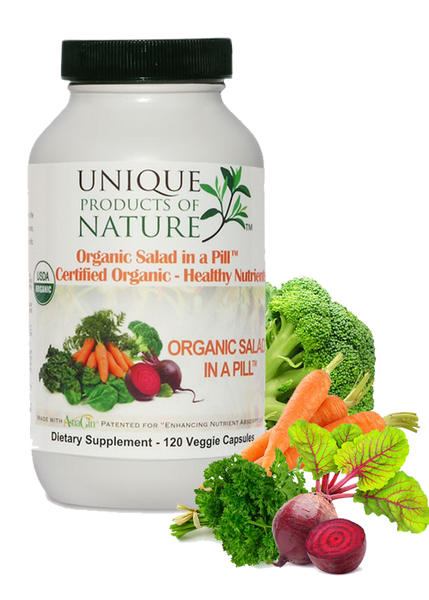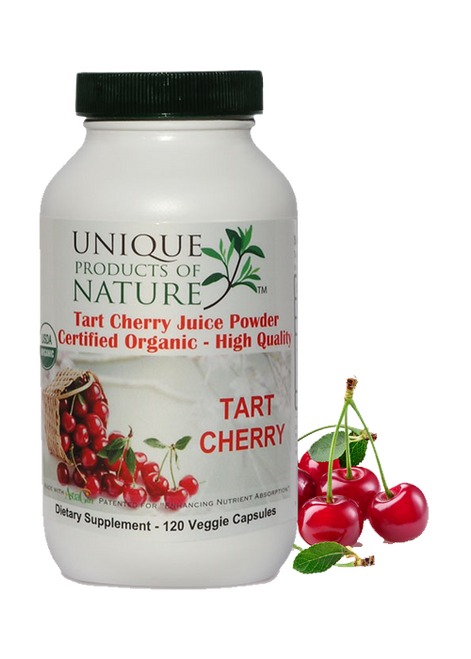Description
Unique Products of Nature offers high quality Certified Organic Salad in a Pill Powder made with AstraGin®, which is Patented for “Enhancing Nutrient Absorption. As most know, it’s not so much what you eat that makes the difference, but what you can absorb. This is a NON-GMO, cGMP USA Manufactured Vegan 100% Natural Product.
Ingredients: Certified Organic Salad in a Pill Powder 935mg Per Serving.
Organic Salad in a Pill Consist Of: Organic Broccoli Powder, Organic Carrot Powder, Organic Spinach Powder, Organic Kale Powder, Organic Beet Powder.
AstraGin® (astragalus membrenacues, panax notoginseng) 25mg Per Serving.
Serving Size: 2 Capsules. Serving per Container: 60. Capsules per Bottle: 120 Veggie Capsules. Dietary Supplement.
Made with AstraGin®. AstraGin® is a patented plant extract proven to increase the absorption of peptides, amino acids, fatty acids, vitamins, phytonutrients and more. Visit NuLivScience.com for more info.
Broccoli (Brassica oleracea italica) is an edible green plant belonging to the cabbage family. This cruciferous vegetable is best cultivated in cool weather and grows 18-30 inches tall. Both the stem and the large head of tight green flower buds can be consumed raw or cooked.
Very low in fat and high in soluble fiber, broccoli provides protein and is packed with phytochemicals that include glucobrassicin, the carotenoids lutein, zeaxanthin and beta-carotene, and the flavonoid kaempferol. Broccoli also contains glucoraphanin (the precursor to sulforaphane) and Indole-3-carbinol. It has a high level of folate and calcium, and is a good source of potassium, vitamin C and pyridoxine.
Carrots (Daucas carota) are a biennial plant consisting of a rosette of leafy dark green foliage and a taproot. Although the leaves of the carrot are edible, the root is the most commonly consumed part of the plant.
Carrots are well-known for their high content of beta-carotene. They are also a very good source of dietary fiber, vitamin C, vitamin K and potassium, and contain other important nutrients like thiamin, niacin, folate, vitamin B6 and manganese.*
Spinach (Spinacia oleracea) is a popular green leafy vegetable consumed raw or cooked. Native to central and western Asia, spinach is related to amaranth, quinoa, beet and chard. The leaves are alternate, oval to triangular in shape, mostly flat, and varied in size, with the leaves at the base of the plant being larger than the leaves higher up the stem.
Spinach is a very good source of carotenoids (beta-carotene, lutein and zeaxanthin), flavonoids (kaempferol and quercetin) and dietary nitrates, as well as a good source of dietary fiber, especially insoluble fiber, and protein. It also contains good amounts of iron, calcium, magnesium, phosphorus, potassium, copper and manganese, and vitamins C, E, K, B6, thiamin, riboflavin and folate.*
Kale (Brassica oleracea acephala) is a member of the Brassica family which includes other cool weather vegetables like broccoli, cauliflower, brussels sprouts and cabbage. Grown for its edible leaves, which are typically light green to dark green or purple, kale’s leaves stand upright and are not packed tight into a head like cabbage leaves, which is why it is called ‘acephala’, meaning headless in Greek.
One of the most nutrient-dense foods available, Kale is an excellent source of vitamins C and K, potassium, iron, copper and manganese. It is a good source of vitamin E, several B vitamins, calcium, magnesium, phosphorus, amino acids and dietary fiber, and also contains some alpha-linolenic acid (ALA), an omega-3 essential fatty acid. Kale is also very good source of numerous plant compounds like chlorophyll, the carotenoids lutein and zeaxanthin, flavonoids like kaempferol and quercetin, and glucosinolates, which are broken down into biologically active compounds such as indoles like indole-3- carbinol, and isothiocyanates like sulforaphane.*
Beet plants (Beta vulgaris) are often grown for their edible taproot, but the beet leaves, or ‘beet greens’, are also consumed. There are several varieties of beet that are of varying shapes and come in different shades of red, yellow or white. Beets are grown worldwide and prefer relatively cool weather, but not severe frosts, for cultivation.
Beet root is an excellent source of dietary nitrate which is transformed in the body to nitrite in the blood, then into the biological messenger molecule, nitric oxide. It is also a rich source of betacyanins; betalain pigments which give red beet root its reddish-purple color. Beet root also contains smaller amounts of phenolic compounds such as flavonoids, phenolic acids and phenolic amides. It is are also rich in carbohydrates, a good source of folate, manganese, potassium, magnesium, phosphorus, calcium, iron, sodium, copper, vitamin C, B-complex vitamins, amino acids and dietary fibers, both soluble and insoluble.*
Disclaimer
While we strive to ensure the accuracy of its product images and product information, some manufacturing changes to packaging display and/or milligrams may be pending update on our site. Although items may occasionally ship with alternate packaging, and/or a small variation in capsule weight, quality and potency is always guaranteed, as well as 100% satisfaction guarantee on all our products. We recommend that you read labels, warnings and directions of all products before use, and not rely solely on the information provided by our website.
Note: It is your responsibility to check product ingredients for any items you may be allergic or sensitive to. If you have a sensitivity or allergic reaction please contact the manufacturer for a refund.
We recommend you consult your physician or a medical professional prior to consuming any supplements.
DISCLAIMER: Righteous Sports Nutrition, LLC does not endorse any product or provide any advice or instructions about its use. Any product descriptions or instructions for use come from the manufacturer. Righteous Sports Nutrition has not conducted any investigation into the accuracy of product descriptions or instructions for use and makes no representations or warranties about such information. All information comes only from the manufacturer, which is solely responsible for its accuracy. Righteous Sports Nutrition makes no representations or warranties related to the efficacy of products sold on this website, our retail locations or about potential or actual side effects. Righteous Sports Nutrition is strictly a reseller and does not in any way makes changes to the products, their packaging, or labeling. Righteous Sports Nutrition does not give medical advice and/or consultations.
*The products and claims made about specific products on this page or through this site have not been evaluated by the United States Food and Drug Administration and are not intended to diagnose, treat, cure or prevent disease. The information provided on this site is for informational purposes only and is not intended as a substitute for advice from your physician or other health care professional or any information contained on or in any product label or packaging. You should not use the information on this site for diagnosis or treatment of any health problem or for prescription of any medication or other treatment. You should consult with a healthcare professional before starting any diet, exercise or supplementation program, before taking any medication, or if you have or suspect you might have a health problem.








